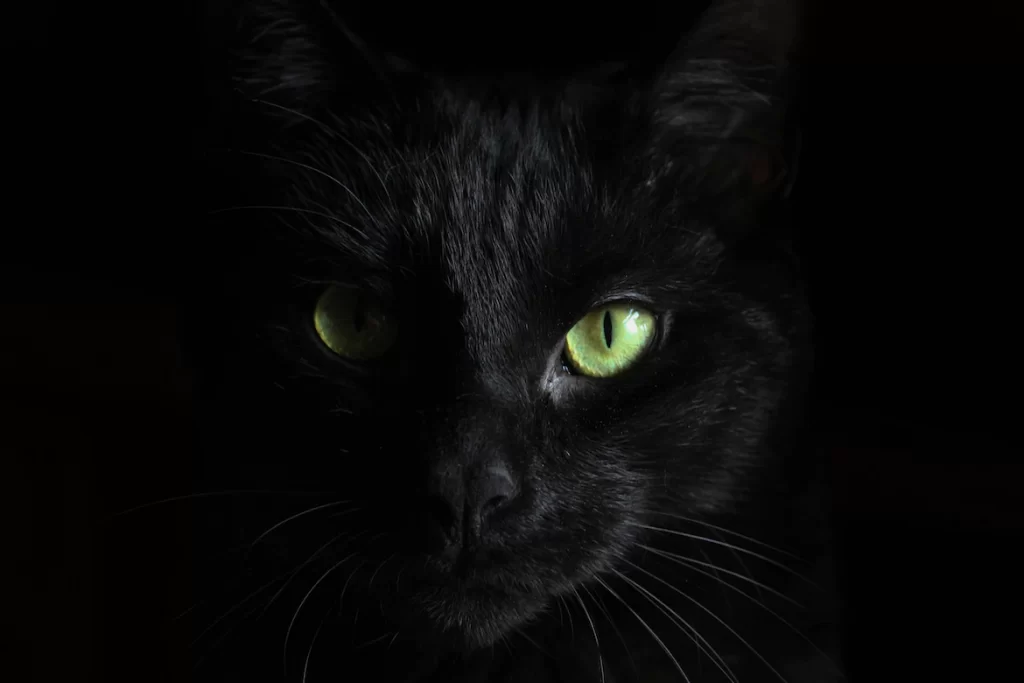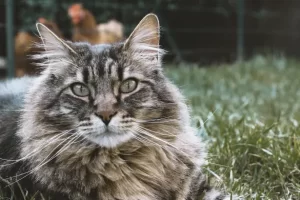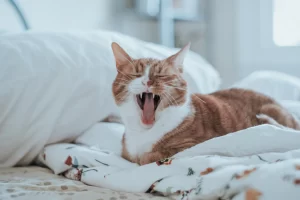Last updated on January 30th, 2023 at 01:58 am

Introduction
Black cats have been around for centuries, believed by some to bring forth bad luck. For those who think black cats are lucky charms, they may be found inviting this unique kitty into their home at any time – they live as long as other colors do and can make terrific companions! While these adorable felines stand out from the crowd with their sleek black coats, there is so much more to love about them. They often have brightly colored eyes and are known to be gentle and affectionate creatures. Despite the superstitions that come along with the color, having a black cat in your life can truly be a magical experience.
Facts about Black Cats
There are numerous misconceptions about black cats, so let’s begin with some facts.
• Black cats have a harder time getting adopted. Studies by a wide variety of groups and shelters show that their adoption and euthanasia rates are among the lowest.
• Superstition typically surrounds black cats. Fear of being unlucky enough to meet a black cat is the second most common superstition.
• The Cat Fanciers’ Association recognizes 22 distinct cat breeds, all of which can have black fur. This is equivalent to around half of all breeds officially recognized by the group.
• Black cats are so common because the B gene responsible for their coat color is the most dominant. For a cat to be born black, all it takes is one carrier of the B gene.
• Solid black cats are more likely to be male.
Myths About Black Cats
Although a black cat can be seen as either a good or terrible omen, the most common black cat superstition involves a black cat crossing your path.
• A black cat can represent a witch. This story draws inspiration from works written and published around the time of the European witch hunts in the 13th and 14th centuries.
• It’s a black cat sent by a witch to torment you. Another myth attributed to the Burning Times.
• In Japanese culture, black cats are seen as symbols of good fortune and financial success. Scotland is home to people with similar beliefs.
• There’s a devil in every black cat. Vox in Rama is the source for this myth.
• An unfortunate black cat. In all likelihood, the Catholic church spread this belief to rake in more money from cursed peasants.
• Black cats have been considered fortunate in dollhouses since at least the Middle Ages.
• The concept that a play will have a long and successful run if a black cat walks into the audience has its roots in the Golden Age.
Are Black Cats Bad Luck?
The cultural idea that black cats bring bad luck has its roots in the past many centuries and varies greatly from one location to the next. In some parts of the world, people believe that black cats bring good luck, whereas in other parts of the world, people link black cats with witches and other forms of evil. These ideas are not supported by evidence and contribute to the perpetuation of detrimental prejudices regarding black cats. Black cats, like all cats, are individuals with their own distinct personalities and characteristics, and they should not be evaluated based on superstition or myth. It is crucial to remember that black cats, like all cats, are individuals.
When it comes to black cats and their purported associations with bad luck, the truth is that many beliefs have been passed on through time due to superstition or anecdotal evidence. Some cultures see black cats as bearers of good fortune, but in many areas of the world, a black cat crossing your path is something to be avoided. However, there is no scientific consensus that black cats bring misfortune – ultimately, it all depends on where you live and what beliefs you accept. Regardless of these disparate beliefs, one thing remains consistent – the love and companionship they provide their owners cannot be overstated. Whether they bring us luck or not, our furry feline friends continue to amaze us each day by simply being themselves.
How These Superstitions Affect Black Cats?
People cannot always comprehend the reasoning behind their visceral reactions. They might not realize that even a silly misconception can get pushed down below the surface of their awareness. The adoption rate for black cats is surprisingly low. We can’t link this specific number to the age-old “bad luck” superstition, although it may play a part.
A research from the University of California, Berkeley found that orange and bi-colored cats are viewed as more likable (and thus more adoptable) than black cats. Black cats have a 50-75% lower chance of being adopted from a shelter than other types of cats, according to studies. There are typically roughly 30% of black cats in a shelter. It’s possible that this is why lighter-skinned children aren’t adopted as often as darker-skinned ones.
As a result of the prejudice towards them, many cats died in the middle ages. Streets in many cities and towns were being systematically culled for black cats because of widespread belief that they were ominous portents. Unfortunately, this prejudice against black cats persists until today.
Due to a centuries-old superstition, these cats are isolated from the outside world for extended periods of time. Black cats are also the target of more cruelty than any other kind of cat. Attacks from humans are more common on them, especially during the Halloween season. Try to keep your black cat inside on Halloween and the days leading up to it.
Mythological Black Cats
Black cats are some of the most mysterious animals in the world and often appear prominently in many cultures’ mythology. They have long been associated with witches, luck, and misfortune, fulfilling specific roles within various mythologies. In Ancient Egypt, black cats were believed to guard sacred places and act as conduits between the gods and mortals; in British folklore, they are symbols of good fortune; while Japanese culture views them as guardians of humans against evil spirits. In fact, even today black cats remain accepted as bringers of luck throughout various cultures around the globe.
The Dark Ages
Superstition flourished during the Middle Ages. It was common practice for individuals to visit a church in the hopes that a priest would bless them and lift whatever curse they may have been under. The breaking of a mirror or the sighting of a black cat didn’t slow them down one bit; in a matter of seconds, they were standing at the church’s door. The Church certainly benefited financially from this practice; therefore, priests encouraged it, spreading fear of black cats across the population. Europe was also hit hard by the bubonic plague at about this time. The prevalence of black cats was seen as a possible cause of the disease outbreak by many. The slaughter of cats had no effect on slowing the plague’s spread since the cats were keeping the rat population in check.
Conclusion
Although black cats have historically been the subject of superstition, these beautiful animals make fantastic companions. They are known for their independent nature and laid back attitude – unlike many other cats, they don’t typically demand a great deal of attention. Black cats are also quite unique given their coats – as they can actually have different shades depending on their breed and gender! Additionally, they can have white accents, like paws or chest spots, adding character to their already fascinating appearance. All in all, owning a black cat is a special experience that is sure to be enjoyable.


